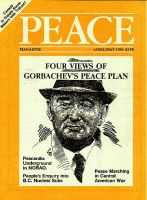
Peace Magazine Apr-May 1986, page 19. Some rights reserved.
Search for other articles by Edward Silva here
Simon Rosenblum, Toronto: James Lorimer 1985. 234 pages. $15.95 hardcover $6.95 paperback
Simon Rosenblum has written a book that will help Canadians make up their minds about cruise missile and Star Wars. Every peace worker should read it' discuss it with friends, and give it as birthday presents to relatives.
Rosenblum shows that these new weapons are part of a new and extremely dangerous phase of the superpower's arms race. Moving well beyond "mutually assured destruction," superpower nuclear thinkers now contemplate "nuclear war-fighting." No longer do they think of simple first strike followed by immediate retaliation. Now they plan complicated, carefully measured nuclear attacks and anticipate these will be followed by thoughtfully graduated retaliation. Particularly in the U.S., MAD checkers has become "war-fighting" chess.
The book traces the curious career and capabilities of the cruise-its 45 year development by German, American, and Soviet war planners. And it foresees its use as a first-strike chess-piece, alongside five other new war-fighting missile systems, the Pershing II, MX, Trident D-5 and Midgetman.
Rosenblum then discusses the newer thinking about fighting (and winning) carefully graduated, prolonged nuclear wars, particularly in Europe, our twentieth century military chessboard. He shows how Star Wars is designed to protect the U.S. from retaliation during a prolonged nuclear war.
Misguided Missiles gives us the big picture, providing the background against which to place The daily news and showing how these weapons cannot meet our security needs. Not simply a gloom-and-doom account, the book suggests how the Canadian government can contribute most.
Rosenblum urges that Canada withdraw support from U.S. nuclear strategies. As neighbor and ally, Canada is uniquely positioned to influence American war plans. Its example would encourage other allies to do the same. Such a Canadian initiative would include: ending cruise testing in Canada; withdrawing from the Defence Development and Production Sharing Arrangement; supporting a nuclear freeze; joining the effort for a NATO 'no-first-use' declaration; opposing Star Wars and prohibiting Canadian firms from participating in it; and refusing to allow NORAD and the North Warning System to be drawn into first-use plans.
Rosenblum's call for an independent Canadian foreign policy will sound utopian to some. Nonetheless, New Zealand is but the latest nation to limit U.S. military access in some way. Others include: France, Denmark, Norway and Iceland (all NATO members), Spain, Portugal, Japan, Egypt, Indonesia, Morocco, Pakistan, Panama, Saudi Arabia, and Thailand. Canada's example might prompt other nations to constrain Washington's pursuit of nuclear superiority over Moscow.
The call, then, is for a more independent Canadian foreign policy-one that is fundamentally pro-American, accepting U.S. military leadership against a perceived Soviet threat, while differing on the numbers and types of weapons.
At root, the misguided missiles of both imperial superpowers are aimed at controlling middle powers (such as Canada and Poland) and small powers (such as Nicaragua and Afghanistan). An independent foreign policy for Canada will slow not only The nuclear arms race, but also The conventional buildup of weaponry that consumes three quarters of the $800 billions spent worldwide each year for weapons.

Peace Magazine Apr-May 1986, page 19. Some rights reserved.
Search for other articles by Edward Silva here